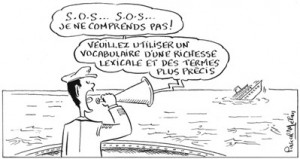– Mariette Aborn

“S.O.S… S.O.S…. I DON’T UNDERSTAND!” “CAN YOU PLEASE USE A RICHER VOCABULARY WITH MORE PRECISE TERMS?”
It would be impossible to say how many new words I’ve learned this semester. Some words are harder to learn, like the word for fulfilling, and others easier because of their utility, like corkscrew. Over the past four months I’ve tried to learn as many new words and expressions as possible, but learning new words is more than studying a vocabulary list.
A distinction between oral and written expression characterizes the French language. Writing follows the rules of formal language, but in conversation almost anything goes. Words and expressions can be oriented to a specific context or even be so familiar that they don’t have an established spelling. As a French learner, these nuances provide plenty of opportunity to make mistakes. For example, I understood the meaning of the phrase “c’estmarrant” correctly – it means that something is funny. However, a misunderstanding of the pronunciation led me to believe they were saying “c’estmarron” which directly translates to « it’s brown ». Another expression that I heard incorrectly is “à un moment donné” which means at a given moment or at some time. I had understood “à moment du nez” which would mean at a moment of nose, a realization I came to quite abruptly when my French friend laughed at me as I tried out my new expression.
While « à unmoment donné » is an established expression, I also discovered a whole slew of interesting slang words. My favorite expression I learned is “chipote,” a word that was spelled four different ways for me by four different French. I first heard the expression when my theater professor was talking about politicians, which in French roughly translates to “political men.” A student offered that the professor might say instead “political men and women” to which another student yelled “oh you, you chipotes”. The closest expression we have to this expression would be “oh you’re splitting hairs” and has become quite useful for me.
The French also borrow English expressions. For them, “shotgun” designates any action first come, first-served. For example, a list with limited spaces to go on a trip would say that the spaces would be “distributed by shotgun.” In this case, the French understood the idea of the word shotgun when applied to a seat in a car as we use it, and they applied this meaning to other contexts.
In all, despite my mistakes, I’m leaving France with an enriched informal and formal vocabulary that I can pull out “à un moment donné.”

Leave a Reply